Kentucky Homeplace
Residents of rural Kentucky have unusually high levels of certain diseases. These include cancer, heart disease, hypertension, asthma, and diabetes. Lifestyle choices, environmental factors, inadequate health insurance and general lack of understanding of the healthcare system are often cited as contributing to this condition. Kentucky Homeplace was created to help address these issues.

Mission
The mission of Kentucky Homeplace is to provide access to medical, social, and environmental services for the citizens of the Commonwealth.
Visions/Goals
The goal of Kentucky Homeplace is to educate Kentuckians to identify risk factors and use preventative measures to become a healthier people with knowledge and skills to access the healthcare and social systems.
Background
Kentucky Homeplace was originally developed by the University of Kentucky Center for Excellence in Rural Health, based in the eastern Kentucky coal-mining town of Hazard, Ky., as a demonstration project in 14 counties. Since its inception in 1994, this community health worker initiative has linked tens of thousands of rural Kentuckians with medical, social and environmental services they otherwise might have gone without. Homeplace’s community health workers are trained to help medically underserved residents access appropriate health services. Emphasis is placed on preventive care, health education and disease self-management.
Today, Homeplace’s geographic service area includes most counties in eastern Kentucky. Residents of these areas are statistically poorer, less educated and less likely to have medical coverage than those in other parts of the state and nation. Further complicating the matter is that most of Kentucky’s 120 counties are designated as medically underserved areas. Yet, in Kentucky, even availability of services is not synonymous with access. Barriers, especially for poor rural people, include lack of knowledge about services, inadequate information on their own conditions, social and cultural inhibitors, lack of money, transportation, and numerous other factors
Who Are the Community Health Workers
Kentucky Homeplace lay health workers have the job title of community health worker (CHW), which has become the preferred term for lay health workers. Homeplace CHWs are selected from the communities in which they live, usually being born and reared there. CHWs know their community and, because of this trust, develop and assure cultural sensitivity to the health disparities and special needs of the clients they serve and the values of health providers with whom they coordinate services.
What We Do
CHWs are employed from the communities they serve and are trained as advocates to provide access to medical, social and environmental services and to deliver education on prevention and disease self management. Homeplace CHWs, as do most CHWs, have the objective of overcoming health inequities across physical, economic, social and cultural dimensions. Kentucky Homeplace CHWs strive to overcome these barriers to improve access to health care for their clients and to assist them in acquiring crucial resources such as eyeglasses, dentures, home heating assistance, food, diabetic supplies, and free medical care. In all of their roles, Homeplace CHWs provide an important bridge between clients with the greatest needs and the primary care physicians and other health providers in the community. They facilitate communication between these clients and primary care physicians, help the clients learn to effectively comply with medical care instructions, and help educate clients to improve their health behaviors, such as improved nutrition, increased physical activity, better weight management, smoking cessation, and improved diabetes self-management.
Who We Serve
The program’s beneficiaries are the medically underserved or “the neediest of the needy.” Most clients are at 100% - 133% of the federal poverty level. Homeplace’s services are offered at no charge to the clients. The need for Kentucky Homeplace has never diminished; in fact, it has continued to grow every year. The quarterly report, “Client Encounters” details the struggles and hardships of the people we serve daily. We are very proud of the difference our program makes in the lives of our clients and their families.
Research - Finding Solutions
Research data is collected and analyzed to identify health trends, socio-cultural and economic barriers. These findings are then used to find solutions for bridging the gaps between uninsured and underserved individuals and the health care delivery system.
In the last five years, Homeplace CHWs have become much more involved in supporting community-based research, including studies of risk reduction for colorectal cancer, lung cancer and cardiovascular disease and studies for improving diabetes outcomes. CHWs have become skilled in locating and enrolling often hard to reach study subjects according to IRB provisions, collecting background and measurement data using computer database programs, and providing overall research support. By being steeped in the culture of clients whom they serve and being aware of their values and special needs, CHWs offer research support that helps assure more representative client samples for health studies, increased adherence to study protocols, and less likelihood of withdrawal from studies. Furthermore, CHWs help clients benefit directly from participating in health studies by giving the time required for careful teaching and reinforcement of learning information by clients who often are characterized by low levels of education and health literacy.